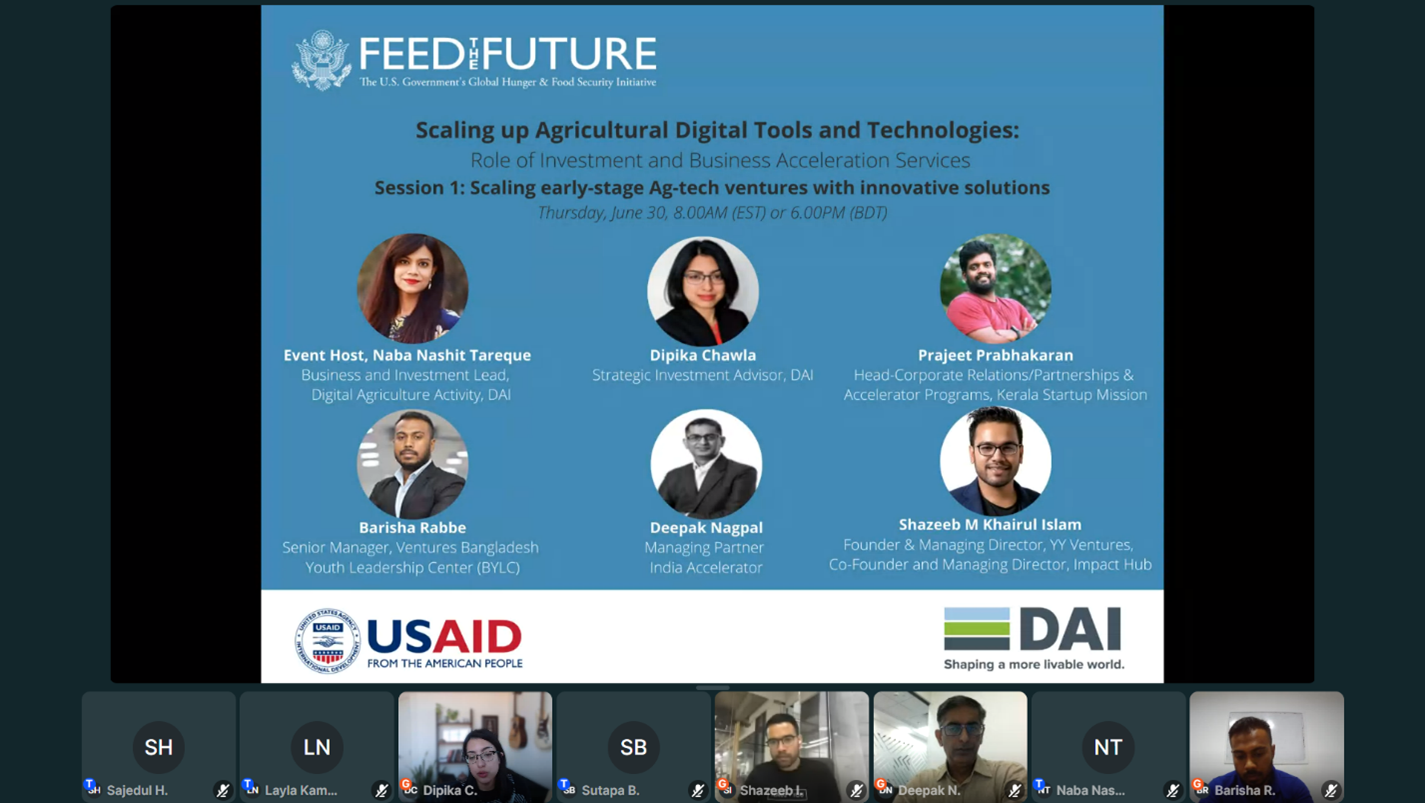Let us know what type of content you'd like to see more of. Fill out our three question survey.
Webinar Series: Connecting Innovators with Funders in Bangladesh
Aug 4, 2022
Identifying and facilitating linkages between those who own promising digital tools for the agriculture sector—better known as AgTech—and those who have funds to invest is key to supporting the long-term sustainability of scalable digital AgTech tools.
Panelists at a recent webinar unpacked exactly how these links can be accomplished. Hosted by the U.S. Agency for International Development (USAID) Feed the Future Bangladesh Digital Agricultural Activity, and the first in a series, “Scaling Digital AgTech: Building Ecosystem for Innovation, Investment, and Sustainability of Digital Tools in Bangladesh” featured panelists from business accelerators, venture capital firms, impact investment organizations, donor organizations supporting digital agriculture tools, and technology firms.

The panel included: Dipika Chawla, Strategic Investment Advisor at DAI; Shazeeb M. Khairul Islam, Founder & Managing Director of YY Ventures and Co-Founder and Managing Director at Impact Hub; Prajeet Prabhakaran, Head of Corporate Relations/Partnerships & Accelerator Programs at Kerala Startup Mission; Deepak Nagpal, Managing Partner at India Accelerator; Barisha Rabbe, Senior Manager of Ventures at Bangladesh Youth Leadership Center; Dr. Zia Uddin Ahmed, Chairman of Venture Investments Partners Bangladesh; Nazmul Karim, Country Manager, Bangladesh for Aavishkaar Capital; Sharawwat Islam, Managing Director for Truvalu.enterprises; Nurul Hai, Vice President of SEAF Bangladesh Ventures; and Sakshi Chadha, Digital Expert Bangladesh for United Nations Capital Development Fund (UNCDF).
“One of the key guiding principles of business accelerators in commercializing AgTech services is to ensure entrepreneurs ‘get out of the building,’ to meet with customers, partners, and users to understand what roles they can play in scaling a business venture,” Chawla said.
It is also essential for technology companies to understand that users and customers can be separate groups, she added. For example, users can be farmers, whereas customers can be chemical fertilizer companies, governments, or other stakeholders. Business accelerators can support such ventures to design their propositions and validate business models to better work with customers to support their user needs.
The panelists discussed what kind of structured support beyond funding business accelerators can offer for early-stage AgTech ventures. Such structured support to help entrepreneurs market test their products and services before launching; connecting them with local and international markets and business partners; and offering mentorship and networking opportunities are all key to establishing a position in the ecosystem.
While at the growth stage, impact investors and venture capitalists can handhold high-growth ventures whose business models envision solving the most pressing user needs.
Islam highlighted how the piloting services offered by the Bangladesh Digital Agricultural Activity complement and de-risk investors’ services. She emphasized that the piloting support can provide credible user testing information of Agtech solutions for sound investment decisions as well as ensure the sustainability of the tools.
Several innovative financing solutions to scale AgTech solutions were discussed by UNCDF’s Chadha. Currently, AgTech solutions are considered high-risk business models by traditional financiers, she added, thus limiting the solutions’ growth by lack of access to finance. Through its Bridge Facility, UNCDF provides financing facilities that are too small for commercial and development banks and too large for microfinance institutions.
Follow this space to hear more about the next webinar and panelists.